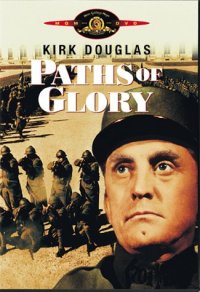|







|
|

 Jurassic
Mark Jurassic
Mark
SCORE: 4
 Stars Stars

Paths of Glory was released in 1957. U.S. servicemen in
Europe were not allowed to see the picture. Paths of Glory wasn't shown in
France until 1974. Such was the controversy over Stanley Kubrick's early
masterpiece.
Any review of Paths of Glory will contain the phrase "anti-war film." I
think that most films labeled "anti-war" are, in reality, "pro war.".
Critically heralded "pro war" movies include Platoon and Saving Private
Ryan. I'm not saying anything bad about these movies. In fact, Platoon and
Saving Private Ryan were the best films of 1986 and 1998 respectively.
When I saw Platoon in its theatrical release, I was surprised by the
audience reaction. During the village massacre scene, several people
actually shouted at the screen: "kill them all" was the gist. I remember
thinking how sad it was that Oliver Stone had poured his soul into a
moderately budgeted movie only to have ignorant jackasses misinterpret his
message. Still, there was no question in my mind that Stone failed to make
an "anti-war" film. Perhaps, more accurately, he failed to persuade the
general public. Using Platoon and Saving Private Ryan as models, I have
come up with some reasons why most "anti-war" attempts fail:
1) Demonstrating the gory details of war is self-defeating. Many people
enjoy violence in movies. Those who don't enjoy violence in movies usually
stay away from violent movies. Ergo, the target audience enjoys the
violence, and those who don't need the message don't see the movie anyway.
2) Heroism has no part in an anti-war picture. Chris from Platoon was
called a "crusader." His mentor Elias died with his arms outstretched in
all the martyred splendor of the Christian Messiah. Saving Private Ryan
has more heroes than the defenders of the Alamo. My point is that heroes
are people we want to emulate. I can't prove it, but I'll bet young people
were more likely to walk out of Platoon or Saving Private Ryan considering
a military career than were likely to protest a U.S. military action.
3) An anti-war film must demonstrate the absurdity of war. Platoon almost
succeeds here because of the negative view of our engagement in Vietnam
from today's perspective. However, Stone chose to ignore politics in
Platoon. Regarding this issue, Saving Private Ryan doesn't even merit
discussion. Very few people question our entry into WWII.
Paths of Glory doesn't break any of these rules (probably because I made
them up for the purpose of this review). Paths of Glory shows something
more upsetting than the village massacre from Platoon, or the D-Day
invasion from Saving Private Ryan. Paths of Glory examines cowardice. And,
in a utterly brilliant twist, Kubrick's film contains no cowards.
This is normally where I would discuss the plot of a movie. Not today. I
don't want to spoil Paths of Glory. The second act of the movie is as
strong as any second act in film history.
I will, however, give credit where credit is due. Unforgettable: the long
black and white tracking shot of Colonel Dax (Kirk Douglas) strolling
through the World War I trench before battle. The palatial, gigantic
interiors of the French Army headquarters. It might as well have been
filmed at Versailles. The performances of Douglas (not usually a favorite
of mine), prisoner Paris (Ralph Meeker), prisoner Ferol (Timothy Carey),
and General Broulard (Adolphe Menjou). Last and not least, an irony laden
anti-war screenplay from Kubrick.
|